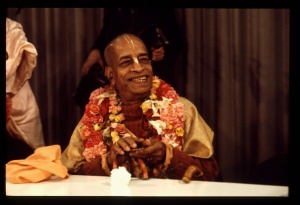SB 3.22.14: Difference between revisions
m (1 revision(s)) |
No edit summary |
||
| Line 1: | Line 1: | ||
{{info | {{info | ||
|speaker= | |speaker=Svāyambhuva Manu | ||
|listener=Kardama Muni | |listener=Kardama Muni | ||
}} | }} | ||
[[Category:Srimad-Bhagavatam - Canto 03 Chapter 22]] | |||
[[Category:Bhagavatam Verses Spoken by Svayambhuva Manu - Vanisource|032214]] | |||
<div style="float:left">'''[[Srimad-Bhagavatam]] - [[SB 3|Third Canto]] - [[SB 3.22: The Marriage of Kardama Muni and Devahuti|Chapter 22: The Marriage of Kardama Muni and Devahūti]]'''</div> | |||
<div style="float:right">[[File:Go-previous.png|link=SB 3.22.13]] '''[[SB 3.22.13]] - [[SB 3.22.15]]''' [[File:Go-next.png|link=SB 3.22.15]]</div> | |||
{{RandomImage}} | |||
==== TEXT 14 ==== | ==== TEXT 14 ==== | ||
<div | <div class="verse"> | ||
ahaṁ tvāśṛṇavaṁ vidvan | :ahaṁ tvāśṛṇavaṁ vidvan | ||
vivāhārthaṁ samudyatam | :vivāhārthaṁ samudyatam | ||
atas tvam upakurvāṇaḥ | :atas tvam upakurvāṇaḥ | ||
prattāṁ pratigṛhāṇa me | :prattāṁ pratigṛhāṇa me | ||
</div> | </div> | ||
| Line 16: | Line 22: | ||
==== SYNONYMS ==== | ==== SYNONYMS ==== | ||
<div | <div class="synonyms"> | ||
''aham''—I; ''tvā''—you; ''aśṛṇavam''—heard; ''vidvan''—O wise man; ''vivāha-artham''—for the sake of marriage; ''samudyatam''—prepared; ''ataḥ''—hence; ''tvam''—you; ''upakurvāṇaḥ''—not taken a vow of perpetual celibacy; ''prattām''—offered; ''pratigṛhāṇa''—please accept; ''me''—of me. | |||
</div> | </div> | ||
| Line 23: | Line 29: | ||
==== TRANSLATION ==== | ==== TRANSLATION ==== | ||
<div | <div class="translation"> | ||
Svāyambhuva Manu continued: O wise man, I heard that you were prepared to marry. Please accept her hand, which is being offered to you by me, since you have not taken a vow of perpetual celibacy. | Svāyambhuva Manu continued: O wise man, I heard that you were prepared to marry. Please accept her hand, which is being offered to you by me, since you have not taken a vow of perpetual celibacy. | ||
</div> | </div> | ||
| Line 30: | Line 36: | ||
==== PURPORT ==== | ==== PURPORT ==== | ||
<div | <div class="purport"> | ||
The principle of brahmacarya is celibacy. There are two kinds of brahmacārīs. One is called naiṣṭhika-brahmacārī, which means one who takes a vow of celibacy for his whole life, whereas the other, the upakurvāṇa-brahmacārī, is a brahmacārī who takes the vow of celibacy up to a certain age. For example, he may take the vow to remain celibate up to twenty-five years of age; then, with the permission of his spiritual master, he enters married life. Brahmacarya is student life, the beginning of life in the spiritual orders, and the principle of brahmacarya is celibacy. Only a householder can indulge in sense gratification or sex life, not a brahmacārī. Svāyambhuva Manu requested Kardama Muni to accept his daughter, since Kardama had not taken the vow of naiṣṭhika-brahmacarya. He was willing to marry, and the suitable daughter of a high royal family was presented. | The principle of ''brahmacarya'' is celibacy. There are two kinds of ''brahmacārīs''. One is called ''naiṣṭhika-brahmacārī'', which means one who takes a vow of celibacy for his whole life, whereas the other, the ''upakurvāṇa-brahmacārī'', is a ''brahmacārī'' who takes the vow of celibacy up to a certain age. For example, he may take the vow to remain celibate up to twenty-five years of age; then, with the permission of his spiritual master, he enters married life. ''Brahmacarya'' is student life, the beginning of life in the spiritual orders, and the principle of ''brahmacarya'' is celibacy. Only a householder can indulge in sense gratification or sex life, not a ''brahmacārī''. Svāyambhuva Manu requested Kardama Muni to accept his daughter, since Kardama had not taken the vow of ''naiṣṭhika-brahmacarya''. He was willing to marry, and the suitable daughter of a high royal family was presented. | ||
</div> | </div> | ||
__NOTOC__ | |||
<div style="float:right; clear:both;">[[File:Go-previous.png|link=SB 3.22.13]] '''[[SB 3.22.13]] - [[SB 3.22.15]]''' [[File:Go-next.png|link=SB 3.22.15]]</div> | |||
__NOTOC__ | |||
__NOEDITSECTION__ | |||
Revision as of 07:47, 7 May 2021

A.C. Bhaktivedanta Swami Prabhupada
TEXT 14
- ahaṁ tvāśṛṇavaṁ vidvan
- vivāhārthaṁ samudyatam
- atas tvam upakurvāṇaḥ
- prattāṁ pratigṛhāṇa me
SYNONYMS
aham—I; tvā—you; aśṛṇavam—heard; vidvan—O wise man; vivāha-artham—for the sake of marriage; samudyatam—prepared; ataḥ—hence; tvam—you; upakurvāṇaḥ—not taken a vow of perpetual celibacy; prattām—offered; pratigṛhāṇa—please accept; me—of me.
TRANSLATION
Svāyambhuva Manu continued: O wise man, I heard that you were prepared to marry. Please accept her hand, which is being offered to you by me, since you have not taken a vow of perpetual celibacy.
PURPORT
The principle of brahmacarya is celibacy. There are two kinds of brahmacārīs. One is called naiṣṭhika-brahmacārī, which means one who takes a vow of celibacy for his whole life, whereas the other, the upakurvāṇa-brahmacārī, is a brahmacārī who takes the vow of celibacy up to a certain age. For example, he may take the vow to remain celibate up to twenty-five years of age; then, with the permission of his spiritual master, he enters married life. Brahmacarya is student life, the beginning of life in the spiritual orders, and the principle of brahmacarya is celibacy. Only a householder can indulge in sense gratification or sex life, not a brahmacārī. Svāyambhuva Manu requested Kardama Muni to accept his daughter, since Kardama had not taken the vow of naiṣṭhika-brahmacarya. He was willing to marry, and the suitable daughter of a high royal family was presented.